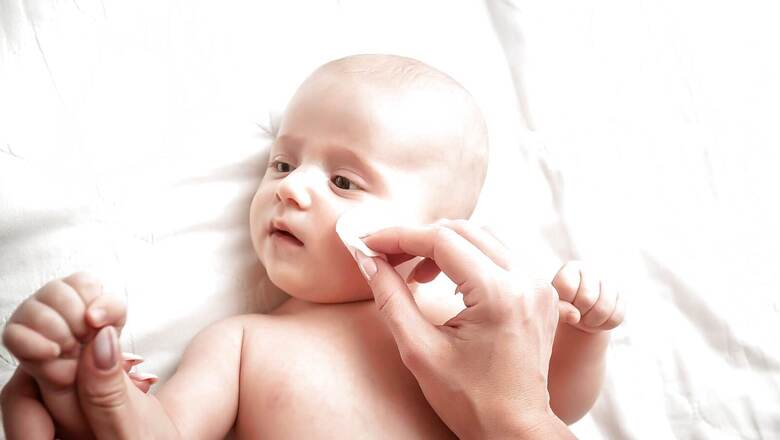
views
The skin is a delicate layer that protects the baby from the harsh effects of the environment. The outermost layer of a new-born’s skin is 30% thinner as compared to an adult’s skin, loses moisture twice as quickly, and is more prone to irritation and damage. Several factors including seasonal changes affect baby’s skin making it vulnerable to rashes, itchiness, allergies, and other complex skin problems.
Baby’s skin should be adequately protected by adopting a thorough skincare routine to ensure long lasting hydration. Identifying the best regime for your tiny tots’ skin can be overwhelming, but all you need to remember is this simple A-B-C to ensure better skin health. Dr Indu Surana MBBS, DCH, Consultant Paediatrician & Neonatologist, D.B.Eye Foundation and Research Center Howrah, Shree Jain Hospital & Research Center, Mitra Sangha Hospital, Howrah, West Bank Multispeciality hospital , ILS Howrah explains the ABCs of skin health.
- Adequate moisturisation
Everyday activities like walking, crawling, and bathing in hot water as well as prolonged exposure to heaters often worsens skin dryness. Moisturising is a crucial aspect of baby’s daily regime, as it hydrates the skin and acts as a barrier against the cold weather. It is advisable to choose moisturisers by brands you can trust, recommended by doctors which are gentle, light and quick absorbing. Parents must choose the right moisturiser equipped with beneficial ingredients like milk protein, Vitamin E, Vitamin B5, Aloe, Glycerine to keep the baby’s skin soft, supple, and nourished. Such ingredients are effective anti-irritants and strengthen skin’s protective barrier to prevent moisture loss and preserve the natural softness of a baby skin.
It is recommended to use baby lotion for the body and baby cream for the face. Since the baby’s face is most exposed to the cold wind, it tends to get dry and patchy. It is important to keep the baby’s cheeks hydrated to prevent dryness.
Also Read: Can Depression Trigger The Risk Of Dementia In Patients? Experts Answer
The Indian Academy of Pediatrics (IAP) have put in place standardised guidelines to ensure quality pediatric skin care for neonates, infants, and children. As per the IAP guidelines, emollients marketed as natural, herbal, and organic should be used with caution. Additionally, parents should refrain from using natural olive oil and mustard oil as moisturising agents. It is advised that one should avoid products which have added parabens, sulphates, or dyes as well as alcohol in baby products which may dry infant skin.
- Bathing routine
As per the Indian Academy of Pediatrics (IAP) guidelines, a proper bathing routine can play a significant role in maintaining adequate nourishment for a baby’s skin during winter. Babies can be bathed two-three times a week as long as necessary hygiene is maintained. The IAP recommends that parents or caregivers should use lukewarm water, as opposed to hot water for a duration not exceeding fifteen minutes. One must use clinically proven mild cleansers with balanced pH levels, hypoallergenic, and specifically designed for a baby’s delicate and sensitive skin to avoid the risk of rashes and skin allergies. Following bathing or sponging, babies should be moisturised immediately when the skin is slightly damp for easier absorption and to protect baby’s skin for long lasting hydration.
- Clean diapers
During colder months, babies are more prone to rashes as they are dressed in multiple layers making it difficult for frequent diaper changes. The diaper area is a sensitive area usually wet with increased pH levels and friction making it prone to infections. It is recommended to frequently change baby’s diapers and gently clean the area. It is best to avoid alcohol-based wipes that may further irritate the skin. Parents should use a moistened cloth or cotton ball soaked in lukewarm water to clean the area after defecation and always keep the diaper area clean and dry. If required, a mild cleanser with a slightly acidic to neutral pH or mild baby wipes can be used for better hygiene. Diapers are best avoided around the clock to allow the baby’s skin to breathe freely.
A dedicated baby skincare regimen can do wonders amidst seasonal changes. These easy steps can help keep your baby’s skin naturally soft, supple, and healthy.
Read all the Latest Lifestyle News here


















Comments
0 comment